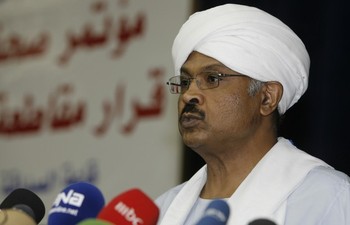Opposition figure says U.S. sanctions won’t topple Sudanese regime
November 1, 2016 (KHARTOUM) – Leading figure at the National Umma Party (NUP) Mubarak al-Fadil on Tuesday has downplayed the renewal of the United States sanctions against Khartoum saying the opposition mustn’t count on the embargo to change the regime.

However, al-Mahdi who is allied with the armed groups since August 2014, issued a statement from his residence in Cairo distancing the NUP from the activities of al-Fadil saying he is no longer a member of the party.
In a press statement extended to Sudan Tribune on Tuesday, Al-Fadil said the U.S. sanctions “wouldn’t topple the regime” but will adversely impact on the residents, economy and future generations.
Sudan is under American economic and trade sanctions since 1997 for its alleged connection to terror networks.
On Monday, U.S. President Barak Obama extended sanctions on Sudan for another year, saying Khartoum actions and policies that caused these sanctions continue to pose a threat to the national security and U.S. foreign policy.
Al-Fadil pointed that the statement issued by the U.S. Department of State has underscored Washington’s commitment to a continued high level policy engagement with Sudan.
On Monday, the U.S. Department of State issued a separate statement minimizing renewal of the sanctions, saying it is “a technical decision and part of a routine, annual process that does not prejudice the ability of the President to provide sanctions relief at any point in the future”.
He called on the opposition to reach a political settlement with Khartoum and “stop running behind mirage”, asking the government to accelerate implementation of the dialogue’s outcome and reforms agreed upon with the international community in order not to “miss this historic opportunity”.
Last month, the political forces participating at the government-led national dialogue concluded the process by signing the National Document which includes the general features of a future constitution to be finalized by transitional institutions.
The opposition groups boycotted the process because the government didn’t agree on humanitarian truce with the armed groups and due to its refusal to implement a number of confidence building measures.
Washington urged Khartoum to consider the government-led dialogue as a first step for a broader process for peace and democratic reforms that will encompasses all the political and armed groups in the country.
In 2002 Al-Fadil defected from the NUP and formed the Umma Reform and Renewal Party (URRP). He was of the view at the time that the NUP should take part in the government while al-Mahdi rejected any participation in a non-democratically elected government.
Following what, he was appointed as a presidential adviser for economic affairs in 2002 and several members of his party were also appointed in various positions in the government.
However, he was sacked in 2004 after a dispute with President Omer Hassan al-Bashir and was arrested in 2007 with a number of retired army generals and accused of attempting to stage a coup. He was released five months later.
(ST)
